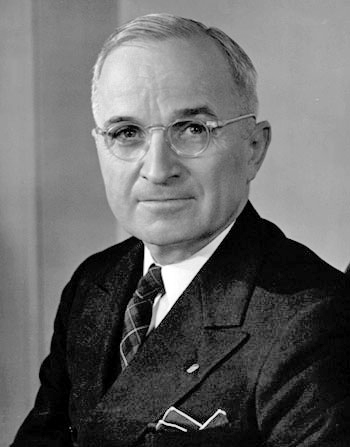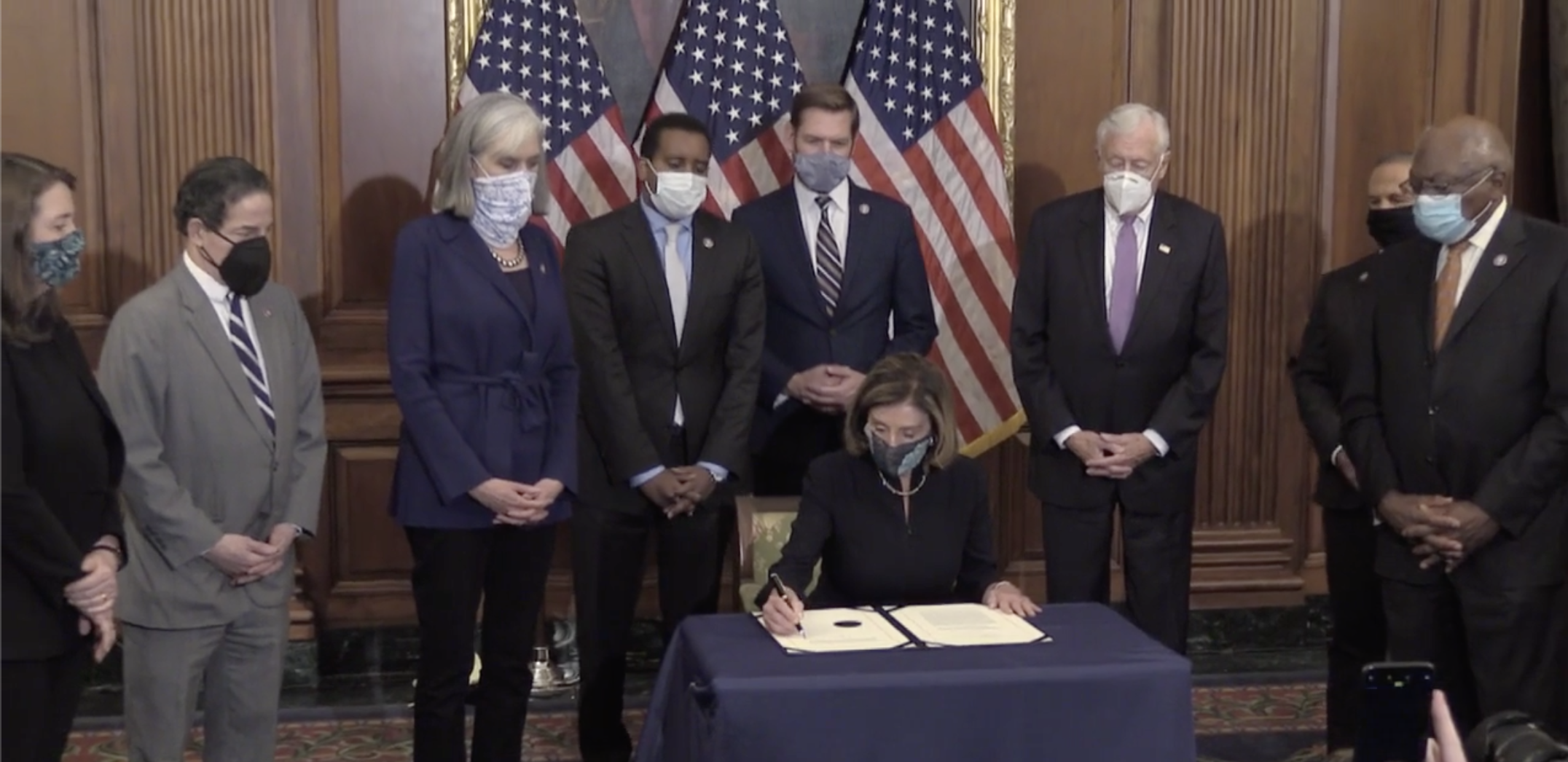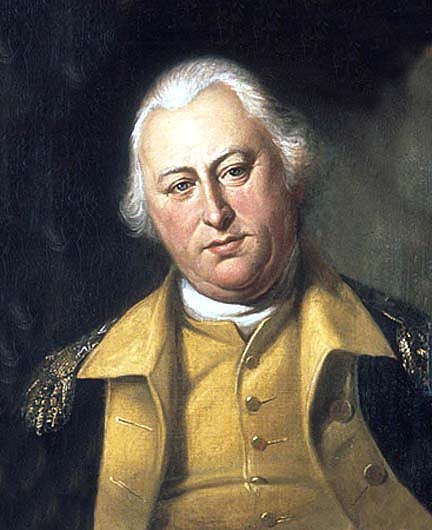|
Articles Of Impeachment
Impeachment in the United States is the process by which a legislature may bring charges against an officeholder for misconduct alleged to have been committed with a penalty of removal. Impeachment may also occur at the state level if the state or commonwealth has provisions for it under its constitution. Impeachment might also occur with tribal governments as well as at the local level of government. The federal House of Representatives can impeach a party with a simple majority of the House members present or such other criteria as the House adopts in accordance with Article One, Section 2, Clause 5 of the United States Constitution. This triggers a federal impeachment trial in the United States Senate, which can vote by a 2/3 majority to convict an official, removing them from office. The Senate can also further, with just a simple-majority vote, vote to bar an individual convicted in a senate impeachment trial from holding future federal office Most state legislatures ... [...More Info...] [...Related Items...] OR: [Wikipedia] [Google] [Baidu] |
Legislature
A legislature is an assembly with the authority to make law Law is a set of rules that are created and are enforceable by social or governmental institutions to regulate behavior,Robertson, ''Crimes against humanity'', 90. with its precise definition a matter of longstanding debate. It has been vario ...s for a Polity, political entity such as a Sovereign state, country or city. They are often contrasted with the Executive (government), executive and Judiciary, judicial powers of government. Laws enacted by legislatures are usually known as primary legislation. In addition, legislatures may observe and steer governing actions, with authority to amend the budget involved. The members of a legislature are called legislators. In a democracy, legislators are most commonly popularly Election, elected, although indirect election and appointment by the executive are also used, particularly for bicameralism, bicameral legislatures featuring an upper chamber. Terminology ... [...More Info...] [...Related Items...] OR: [Wikipedia] [Google] [Baidu] |
Vice President Of The United States
The vice president of the United States (VPOTUS) is the second-highest officer in the executive branch of the U.S. federal government, after the president of the United States, and ranks first in the presidential line of succession. The vice president is also an officer in the legislative branch, as the president of the Senate. In this capacity, the vice president is empowered to preside over Senate deliberations at any time, but may not vote except to cast a tie-breaking vote. The vice president is indirectly elected together with the president to a four-year term of office by the people of the United States through the Electoral College. The modern vice presidency is a position of significant power and is widely seen as an integral part of a president's administration. While the exact nature of the role varies in each administration, most modern vice presidents serve as a key presidential advisor, governing partner, and representative of the president. The vice president ... [...More Info...] [...Related Items...] OR: [Wikipedia] [Google] [Baidu] |
Vice President Of The United States
The vice president of the United States (VPOTUS) is the second-highest officer in the executive branch of the U.S. federal government, after the president of the United States, and ranks first in the presidential line of succession. The vice president is also an officer in the legislative branch, as the president of the Senate. In this capacity, the vice president is empowered to preside over Senate deliberations at any time, but may not vote except to cast a tie-breaking vote. The vice president is indirectly elected together with the president to a four-year term of office by the people of the United States through the Electoral College. The modern vice presidency is a position of significant power and is widely seen as an integral part of a president's administration. While the exact nature of the role varies in each administration, most modern vice presidents serve as a key presidential advisor, governing partner, and representative of the president. The vice president ... [...More Info...] [...Related Items...] OR: [Wikipedia] [Google] [Baidu] |
Presiding Officer Of The United States Senate
The presiding officer of the United States Senate is the person who presides over the United States Senate and is charged with maintaining order and decorum, recognizing members to speak, and interpreting the Senate's rules, practices, and precedents. Senate presiding officer is a role, not an actual office. The actual role is usually performed by one of three officials: the vice president of the United States; an elected United States senator; or, under certain circumstances, the chief justice of the United States. Outside the constitutionally mandated roles, the actual appointment of a person to do the job of presiding over the Senate as a body is governed by Rule I of the Standing Rules. The United States Constitution establishes the vice president as president of the Senate, with the authority to cast a tie-breaking vote. Early vice presidents took an active role in regularly presiding over proceedings of the body, with the president pro tempore only being called on during t ... [...More Info...] [...Related Items...] OR: [Wikipedia] [Google] [Baidu] |
Impeachment Inquiry In The United States
In the United States, an impeachment inquiry (also known as an impeachment investigation) is an investigation or inquiry which usually occurs before a potential impeachment vote. Federal An impeachment inquiry is not a required step in United States federal impeachment, as the Constitution of the United States does not require the United States House of Representatives (which it empowers to impeach many federal officeholders) to exercise its powers of impeachment in any specific manner. It is permissible for articles of impeachment to be adopted without any formal inquiry first occurring. Nevertheless, impeachment inquiries have been used as a step in many federal impeachment efforts, with around 90 impeachment-related inquiries having been initiated by the House of Representatives since 1789. No individual had been impeached by the United States House of Representatives without a preceding inquiry stage until the second impeachment of Donald Trump in 2021. Launching of a ... [...More Info...] [...Related Items...] OR: [Wikipedia] [Google] [Baidu] |
Second Impeachment Of Donald Trump
Donald Trump, the 45th president of the United States, was impeached for the second time on January 13, 2021, one week before his term expired. It was the fourth impeachment of a U.S. president, and the second for Trump after his first impeachment in December 2019. Ten Republican representatives voted for the second impeachment, the most pro-impeachment votes ever from a president's party. This was also the first presidential impeachment in which the majority caucus voted unanimously for impeachment. The House of Representatives of the 117th U.S. Congress adopted one article of impeachment against Trump of " incitement of insurrection", stating that he had incited the January 6 attack of the U.S. Capitol. These events were preceded by attempts by Trump to overturn the 2020 presidential election, as well as his pushing of voter fraud conspiracy theories on his social media channels before, during, and after the election. A single article of impeachment charging T ... [...More Info...] [...Related Items...] OR: [Wikipedia] [Google] [Baidu] |
Second Impeachment Trial Of Donald Trump
The second impeachment trial of Donald Trump, the 45th president of the United States, began on February 9, 2021, and concluded with his acquittal on February 13. Trump had been impeached for the second time by the House of Representatives on January 13, 2021. The House adopted one article of impeachment against Trump: incitement of insurrection. He is the only U.S. president and only federal official to be impeached twice. He was impeached by the House seven days prior to the expiration of his term and the inauguration of Joe Biden. Because he left office before the trial, this was the first impeachment trial of a former president. The article of impeachment addressed Trump's attempts to overturn the 2020 presidential election results (including his claims of election fraud and his efforts to pressure election officials in Georgia) and stated that Trump incited the attack on the Capitol in Washington, D.C., while Congress was convened to count the electoral votes ... [...More Info...] [...Related Items...] OR: [Wikipedia] [Google] [Baidu] |
United States Secretary Of War
The secretary of war was a member of the U.S. president's Cabinet, beginning with George Washington's administration. A similar position, called either "Secretary at War" or "Secretary of War", had been appointed to serve the Congress of the Confederation under the Articles of Confederation between 1781 and 1789. Benjamin Lincoln and later Henry Knox held the position. When Washington was inaugurated as the first President under the Constitution, he appointed Knox to continue serving as Secretary of War. The secretary of war was the head of the War Department. At first, he was responsible for all military affairs, including naval affairs. In 1798, the secretary of the Navy was created by statute, and the scope of responsibility for this office was reduced to the affairs of the United States Army. From 1886 onward, the secretary of war was in the line of succession to the presidency, after the vice president of the United States, the Speaker of the House of Representative ... [...More Info...] [...Related Items...] OR: [Wikipedia] [Google] [Baidu] |
William W
William is a male given name of Germanic origin.Hanks, Hardcastle and Hodges, ''Oxford Dictionary of First Names'', Oxford University Press, 2nd edition, , p. 276. It became very popular in the English language after the Norman conquest of England in 1066,All Things William"Meaning & Origin of the Name"/ref> and remained so throughout the Middle Ages and into the modern era. It is sometimes abbreviated "Wm." Shortened familiar versions in English include Will, Wills, Willy, Willie, Bill, and Billy. A common Irish form is Liam. Scottish diminutives include Wull, Willie or Wullie (as in Oor Wullie or the play ''Douglas''). Female forms are Willa, Willemina, Wilma and Wilhelmina. Etymology William is related to the given name ''Wilhelm'' (cf. Proto-Germanic ᚹᛁᛚᛃᚨᚺᛖᛚᛗᚨᛉ, ''*Wiljahelmaz'' > German '' Wilhelm'' and Old Norse ᚢᛁᛚᛋᛅᚼᛅᛚᛘᛅᛋ, ''Vilhjálmr''). By regular sound changes, the native, inherited English form of the name shoul ... [...More Info...] [...Related Items...] OR: [Wikipedia] [Google] [Baidu] |
William Blount
William Blount (March 26, 1749March 21, 1800) was an American Founding Father, statesman, farmer and land speculator who signed the United States Constitution. He was a member of the North Carolina delegation at the Constitutional Convention of 1787 and led the efforts for North Carolina to ratify the Constitution in 1789 at the Fayetteville Convention. He then served as the only governor of the Southwest Territory and played a leading role in helping the territory gain admission to the union as the state of Tennessee. He was selected as one of Tennessee's initial United States Senators in 1796, serving until he was expelled for treason in 1797.Terry Weeks,William Blount" ''Tennessee Encyclopedia of History and Culture'', 2010. Accessed 10 September 2012. Born to a prominent North Carolina family, Blount served as a paymaster during the American Revolutionary War. He was elected to the North Carolina legislature in 1781, where he remained in one role or another for most of the ... [...More Info...] [...Related Items...] OR: [Wikipedia] [Google] [Baidu] |
List Of United States Representatives Expelled, Censured, Or Reprimanded
The United States Constitution (Article 1, Section 5) gives the House of Representatives the power to expel any member by a two-thirds vote. Expulsion of a Representative is rare: only five members of the House have been expelled in its history. Three of those five were expelled in 1861 for joining the Confederate States of America.CRS Report For Congress However, the House has other, less severe measures with which to discipline members. Censure and reprimand are procedures in which the House may vote to express formal disapproval of a member's conduct. Only a simple majority vote is required. Members who are censured must stand in the well of the House chamber to receive a reading of the censure resolution. A reprimand was once considered synonymous with censure, but in 1976 the House defined a reprimand as ... [...More Info...] [...Related Items...] OR: [Wikipedia] [Google] [Baidu] |





.jpg)



